Advances In Tyre Building Machinery
- By Gregers Lindvig
- June 16, 2021
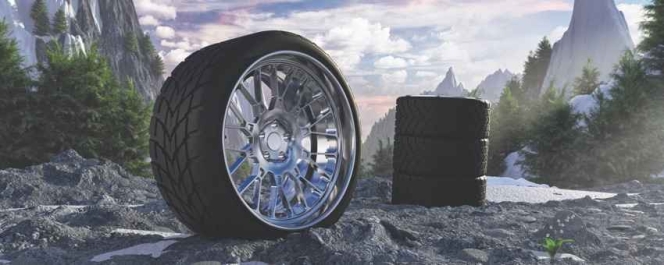
The tyre is an amazing example of something that has served its purpose for more than a century with no drastic functional changes but has yet undergone constant improvement and sometimes fundamental structural changes. Materials have changed from leather to natural rubber, and then to ever-developing compounds of natural and synthetic rubber, as well as chemicals. Structurally, the largest change has been from bias to radial casing construction, and while some tyre products are now largely only radial tyres – passenger car tyres, for example – other vehicle segments still consume a large quantity of bias tyres; in some regions of the world more than others.
While the equipment required to produce bias tyres is fairly simple, and the costs of establishing a production line therefore relatively manageable – roughly speaking it’s a textile production line combined with vulcanizing in simple 2-part moulds – the costs of establishing a radial tyre production line are massive. From rubber calenders to radial steel belt production and angle cutting over bead ring building and green tyre building drums, until finally curing in 8-segment moulds – and many more steps and essential equipment not mentioned in between. Each machine and process is as important as the next, and only the most skilled management of the entyre production flow can ensure that a quality product comes out at the end. So, needless to say, many of the quality improvements of the past decades have come from improving production equipment and knowledge as much as from improving tread designs and rubber compounds.
Chinese factories
Further, as many tyre production equipment manufacturers have expanded to supply all over the world, many production lines have become much more similar to each other as they approach the worldwide optimal standard for balancing production costs and quality. I won’t mention any specific manufacturer names here, but anyone who has visited a tyre factory in China will have had an employee guide proudly point out that they use only the best equipment from manufacturers in the Netherlands, Japan, Germany, and the USA. I’ve always been tempted to ask if the hammer is more important or the person who wields it, but I digress. The fact is that most Chinese factories have also improved drastically in terms of management and comply with IATF 16949 standards to ensure consistently high-quality levels and constantly reduce defects. The main driver and reason for the current standards is the reduction of manual work stations and a large manual labour workforce to largely automatic or at least semi-automatic machinery, reducing the manual labourers to employees simply moving materials or finished products from one place to another. Over time, these will also be made redundant, as machines will also handle this part.
The question remaining is just how factories located in low-wage countries will keep competitive as the necessary equipment costs the same all over the globe, and less hands are needed to operate the massive production lines. When the lines all over the world only need core staff to monitor and make technical adjustments and maintenance work, the difference in the product cost structure can only come from land and building use, logistics and handling costs, as well as water, heating, and electricity fees. Especially the latter, utility fees, probably soon make up the most important factory when it comes to differentiating tyre cost structures across the world.
Global supply
What will this mean for the global tyre supply? Most likely, it will be good news for the environment, as it won’t make as much sense as previously to send products across the globe, because the transportation costs will make the products more expensive than locally produced ones – regardless of production country. Given that all countries play fair, that is, so maybe I should say in a perfect world. There is no doubt that some countries favour their large factories with subsidies or tax rebates more than the developed countries do. But, with the recent massive rise in sea freight charges caused by the pandemic, and amplified by the Ever Given blocking the Suez Canal, the tables could be turned faster than anyone expected. Just until a month ago we all expected the extremely high sea freight levels from Asia to the rest of the world to last just a few months, now the carriers expect that we won’t see normalization – and thereby decreasing rates – again until 2024. As tyre prices from low-cost manufacturing countries have been gradually closing the gap to second tier brands over the past decade (and quality levels have followed suit and in rare cases even surpassed them), they have now very suddenly lost all competitiveness when solely looking at pricing. Surely, it has been the strategy of all these manufacturers for many years to ultimately surpass the competition on quality and performance, but not before surpassing them on price.
So, what will happen now? Nobody knows, but it will be equally interesting and nerve-wracking to follow. For the tyre building machine manufacturers, the dilemma has grown bigger than ever before; should they continue to develop better machines, as they risk killing their clients by doing do? There’s a very narrow path to tread between staying competitive against other machine manufacturers and sustaining the financial health of one’s own clients. (TT)
Hankook Confirms Partnership As Sponsor For Convoy Truck Shows 2026
- By TT News
- March 04, 2026
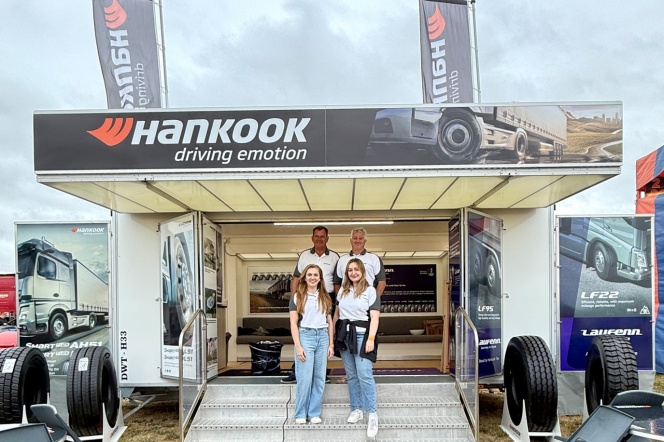
Hankook has confirmed its partnership for the 2026 Convoy Truck Shows, stepping in as an infield partner for the series, which runs in tandem with the British Truck Racing Championships (BTRC). These events offer a distinctive fusion of high-octane track action and the immersive atmosphere of a large-scale truck gathering. This renewed involvement deepens Hankook’s footprint at some of the most eagerly awaited dates on the UK motorsport and haulage calendar.
The season’s schedule commences with Convoy on the Plain on 16–17 May, followed by Convoy Cymru on 20–21 June. The flagship gathering, Convoy in the Park, will round off the summer season on 8–9 August. Attendees can look forward to a full agenda of British truck racing, breathtaking stunt performances, live entertainment and attractions for all ages, alongside a remarkable display of working vehicles, custom rigs and pristine show trucks. Mirroring its sponsorship of the Devon Truck Show, Hankook’s partnership with the Convoy series supports its wider mission to generate substantial donations for local charitable causes and community groups, positioning it as an event with purpose beyond spectacle.
At each of these shows, Hankook will spotlight its cutting-edge range of commercial and consumer tyres. Key exhibits will feature the SmartFlex AH51 for steer axles and the SmartFlex DH51 for drives, both engineered for long-haul and regional use and prized for superior traction and extended durability. Also on show will be the SmartFlex TH31 trailer tyre, the Vantra Transit summer tyre for commercial vans and several models from the Laufenn portfolio, such as the LZ22 all-weather drive tyre, the LF21 all-position tyre and the robust LF95 trailer tyre.
Rounding out the display are the Dynapro HP2 all-season SUV tyre and the iON evo SUV, a cutting-edge summer tyre purpose-built for electric vehicles, underlining Hankook’s forward-looking approach to sustainable mobility. Through its involvement in the Convoy Truck Shows, Hankook reinforces its dedication to the haulage industry by engaging directly with drivers, fleet operators and enthusiasts, showcasing tyre innovations focused on safety, efficiency and peak performance, all while actively contributing to valuable community initiatives.
Event Director Mike Quartley said, "We’re thrilled to have Hankook Tyre UK return as an official sponsor of the Convoy Truck Shows. After the success of last year’s collaboration, continuing the partnership was an easy decision for us. Hankook’s commitment to the industry and to our events adds real value across the board – from contributing to the scale and quality of the events to elevating the atmosphere and experience for our audience. We’re proud to be building on this relationship as the Convoy series continues to grow.”
- Tire Technology Expo 2026
- 2026 Tire Technology International Awards
- BioButterfly Project
- Twaron Next
- Lunar Airless Wheel
- Primacy 5 Energy
Tyre Industry Celebrates Innovation And Sustainability At 2026 Tire Technology International Awards
- By TT News
- March 04, 2026
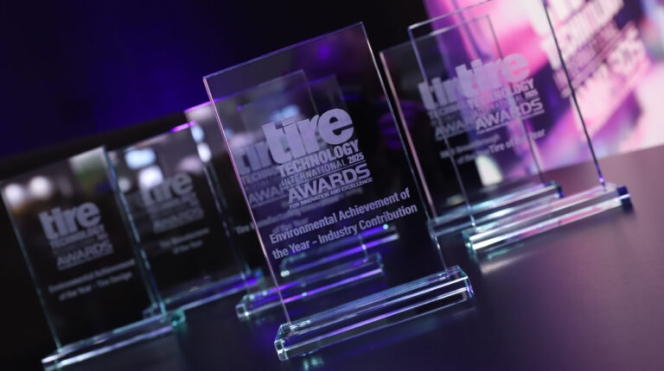
The tyre industry gathered to honour outstanding innovation and individual accomplishment over the past year during the Tire Technology Expo 2026 held in Hannover. The Tire Technology International Awards, spanning 13 categories, recognised both technological progress and the commitment to a more sustainable future within the tyre sector. Organised by the Tire Technology International magazine, the winners were selected by an independent panel of journalists and technical experts.
Sustainability was a dominant theme, highlighted by three distinct environmental awards. Bridgestone received the award for tyre design innovation, celebrated for developing a truck tyre composed of 70 percent recycled and renewable materials, a notable industry milestone. In manufacturing, Continental was acknowledged for its significant strides in reducing freshwater consumption during production with the Environmental Achievement of the Year – Manufacturing award. The Environmental Achievement – Industry Contribution award went to the BioButterfly project, a collaborative effort involving Michelin, IFP Energies Nouvelles and Axens. This initiative was praised for creating bio-based butadiene from bioethanol, presenting a credible substitute for fossil fuel-derived materials and demonstrating strong potential for immediate industrial application.
Further technical achievements were recognised across several categories. Flexsys earned the Chemicals and Compounding Innovation of the Year award for developing the first practical alternative to the antioxidant 6PPD after extensive research. Teijin Aramid was honoured with the Materials Innovation of the Year award for industrialisation of its high-performance Twaron Next para-aramid fibre. A collaborative R&D breakthrough by Goodyear and TNO, which integrates tyre intelligence directly into a vehicle's automatic emergency braking systems to enhance safety, won the R&D Breakthrough of the Year award. In manufacturing equipment, Comerio Ercole’s advanced modular calendering line, Zeus, won the Tire Manufacturing Innovation of the Year award. Uzer Makina, a long-time finalist, was finally named Tyre Industry Supplier of the Year.
The event also celebrated conceptual and product excellence. Michelin had a particularly successful evening, first winning the Tire Concept of the Year award for its Lunar Airless Wheel, designed to withstand the extreme conditions on the moon. The company then claimed the highly anticipated Tire of the Year award for its Primacy 5 Energy, a tyre noted by the jury for achieving top EU label ratings in most sizes while offering improved longevity and reduced emissions compared to its predecessor. In the final major category, Continental was named Tire Manufacturer of the Year for the second consecutive year and the fifth time overall, following a review of the top manufacturers' yearly contributions.
The awards also highlighted personal achievements within the field. The Young Scientist Prize for 2026 was presented to Max Dixey, a PhD student at Queen Mary University of London, for his compelling presentation on the effects of carbon black activators. Finally, a Lifetime Achievement Award was bestowed upon Michelin’s Pascal Prost. A veteran engineer, researcher and long-time contributor to both the conference and the awards jury, Prost was celebrated by peers and colleagues for his enduring and significant impact on the tyre industry.
Matt Ross, Chairman of the awards and Editor-in-Chief of Tire Technology International, said, “As is now becoming the norm, this year’s awards were incredibly close. Continental and Michelin have picked up multiple awards and should be highly commended, but I’m also happy to see such an array of winners across the whole range of categories. The level of innovation on display across the tyre sector is staggering, and I hope that this year’s awards have captured even a hint of the groundbreaking work taking place to move this industry forward.”
On Frost’s achievement, Ross said, “For as long as I have worked on Tire Technology International and these awards, Pascal has been a valued contributor, a hugely appreciated advisor – and a wonderful sounding board. I would like to join with his peers and friends from across the industry in celebrating his phenomenal contribution to the tyre business.”
MRF Signs MoU With Tamil Nadu For Greenfield Plant At Sivaganga
- By TT News
- March 04, 2026
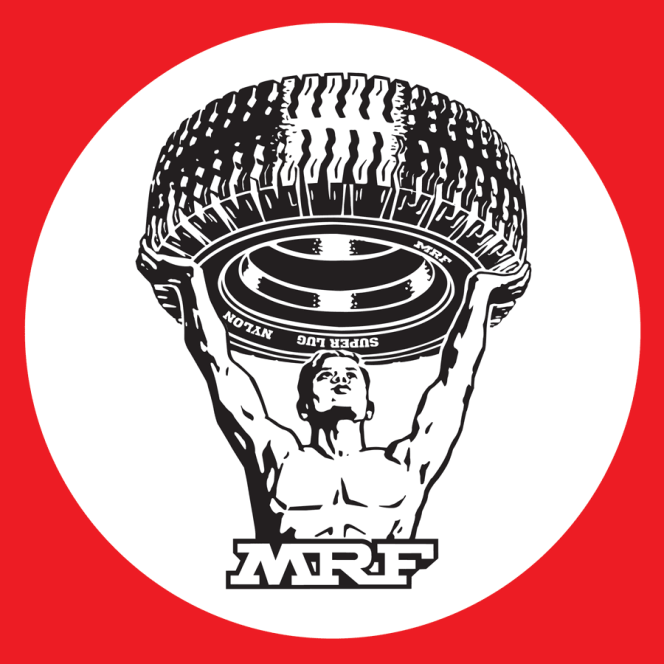
MRF has announced a significant move to expand its manufacturing footprint in southern India. The company revealed that it has signed a non-binding memorandum of understanding (MOU) with the Tamil Nadu Government, facilitated through the state’s nodal investment promotion agency, Guidance. This preliminary agreement outlines the company’s intent to establish a greenfield manufacturing unit dedicated to the production of automotive tyres and related ancillary products. The proposed facility is planned for location within the SIPCOT Industrial Park situated in the Sivaganga District of Tamil Nadu.
As the agreement is currently non-binding, its progression to a final commitment is contingent upon several conditions. These include the Tamil Nadu government’s sanction of a bespoke incentive package, the provision of necessary infrastructure, the allotment of land and the securing of all requisite statutory approvals in accordance with applicable state laws.
According to the official statement released by MRF, the project, upon receiving all clearances and moving forward, envisions a substantial capital outlay. The estimated investment for this venture is projected to be approximately INR 53 billion, with the capital expenditure to be phased over a 12-year period. Beyond the financial injection into the region’s economy, the initiative is also anticipated to be a major source of employment, with expectations of creating direct job opportunities for around 1,000 individuals.
- Sailun Group
- Sustainable Development (ESG) Industrial Ecosystem Innovation Competition
- Vale
- Mining Tyres
Sailun Group Honoured With ‘Innovative Model’ Award At Shanghai ESG Competition
- By TT News
- March 04, 2026
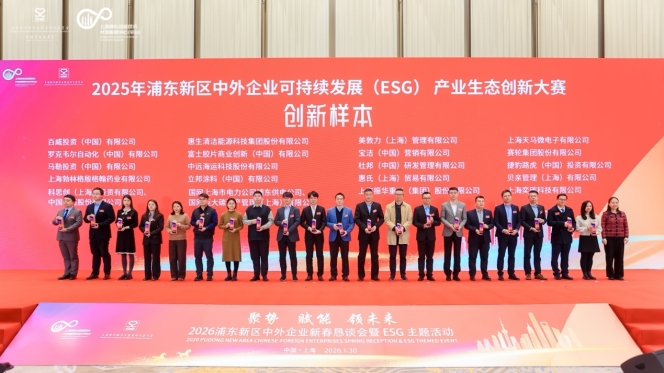
The second Sustainable Development (ESG) Industrial Ecosystem Innovation Competition for Chinese and Foreign Enterprises in Shanghai’s Pudong New Area recently concluded, with Sailun Group emerging as a distinguished honouree. Recognised for its collaborative ESG efforts with Vale, a global leader in metal and mining, Sailun received the prestigious ‘Innovative Model’ award, standing out as the sole tire company to achieve this recognition.
Organised jointly by the Shanghai Pudong Foreign-Invested Enterprises Association and the Shanghai Pudong Domestic-Funded Enterprises Association, the competition welcomed participation from companies registered and operating in the area, along with their partners. Invited by Vale Metals (Shanghai), Sailun took an active role by meticulously organising and presenting its innovative achievements in sustainable development. Through a structured application process highlighting solid practices and creative excellence, the company successfully secured the award.

Vale, one of the world’s foremost iron ore producers, maintains a longstanding strategic partnership with Sailun. Driven by a mutual dedication to sustainable supply chains, the two organisations have intensified collaboration, particularly in mining tyre supply. By integrating Sailun’s low-carbon tyre technologies, they inject environmental vitality into operations while enabling Vale to achieve refined efficiency through cutting-edge solutions. Their partnership exemplifies a synergistic model that harmonises efficiency, safety and low-carbon practices, serving as a standout case of ESG-driven empowerment across the industrial chain.







Comments (0)
ADD COMMENT